- Home
- Fredric Brown
The Dead Ringer Page 5
The Dead Ringer Read online
Page 5
“You’re right,” he said, “in putting it that way. If you admit that the carnival is the enemy camp. If you admit it’s the enemy of law and order to the extent that it’ll condone cold-blooded murder. If you feel you’re on the side of the killer, just because he happens to be a carney. Do you feel that way about it, Ed?” I grinned a little. I said, “Kind of got me out on a limb there.”
“Kind of,” he said. “Well, think it over and let me know. I won’t push you any more. And be careful.”
“Careful?”
“I mean, don’t go around asking questions. That could be dangerous, and I’m not kidding. People who do murder don’t like people who ask questions about it. Say—nobody besides your uncle knows you came here tonight, do they?”
“No,” I said. “All right. I’ll think it over, Cap. But probably I won’t hear or see anything anyway.” I drank the last of my beer and stood up. “I think I better go now. I want to get back in time to help Uncle Am a little.”
He didn’t argue to get me to stay. He shook hands kind of solemn when I left, and Mrs. Weiss came in the room, wiping her hands on her apron. She shook hands, too, and it made me feel kind of foolish; I don’t know why. But she said, “Don’t let him talk you into anything, Ed.”
“I won’t,” I said.
And, walking back to the lot, I decided I wouldn’t. I mean, that I wouldn’t do anything active about it or stick my neck out. Just minding my own business wasn’t being on the killer’s side.
There was a fine mist in the air; it made haloes around all the lights on the lot. It made the Ferris wheel seem a mile tall. It muffled sounds and made everything seem unreal. Even more unreal, that is, than a carney usually seems.
I stood there at the curb outside, looking at the big entrance gate, big and bright and gay like the gates of Paradise, that was set back forty feet or so from the street. Through it and around it I could see the tops and the midway; I could hear the screech of the Whip, the thump of a bass drum call to bally, and the thousand voices blending into one big voice, a voice of the crowd and the carney mixed, all one strange sound. It was as though I’d never seen a carney lot before, or heard that sound.
People were brushing past me, there was a real crowd streaming up to the entrance. A bigger crowd than most Saturday or Sunday night crowds, in spite of the mist and the threat of rain. It looked like a good crowd, too, a crowd that didn’t have its pockets sewed shut. There’s a difference between a good crowd and a big crowd; this one was both.
I started up toward the gate and then changed my mind and went around the outside to our sleeping tent and stashed my trombone; I didn’t want to walk down the midway with it and get somebody wondering where I’d been playing it.
Then I ducked under the side wall of our ball game booth. You can get a baseball in the eye doing that, but I didn’t.
Uncle Am and Marge Hoagland were running the booth, and getting a good play.
Uncle Am said, “Show must have got out early, huh, Ed?” I knew he was tipping me off what he’d told Marge, so I played along.
I said, “I didn’t stay to see all of it. It smelled.”
Uncle Am pulled me over to one side of the booth, out of Marge’s hearing and said, “Don’t hang around, Ed. I promised Marge a cut on what we took in, and if you’re here she’ll think she ought to leave; that I don’t need her. So run along and play somewhere else, huh?”
“Sure, but—”
“No buts. Look, Marge can use the money. Hoagy hasn’t been doing too well lately, Ed. And he’s been dropping some gambling. He lost fifty bucks the night of the blackjack game early this week, and sixty last night at gin rummy and—”
“And you won it?”
“I won the sixty, yeah. So I’m letting Marge get some of it back for pin money. So run along.”
“Okay, okay,” I said. “Don’t push.”
“I’m just shoving. Here’s a dime; get yourself a hot dog.” He stuck something into the breast pocket of my suit coat. I couldn’t see it, but I knew it would be a fin instead of a dime.
I said, “Thanks. I take it you don’t mind if I leave, then?”
He grinned and gave me a push and I had to step quick to get over the low counter in front of the booth without falling over it.
I joined the crowd drifting down the midway. The mob was even thicker than I’d thought. I let myself be carried along with the current and found myself in a thick jam in front of the side show. I got stuck there, nobody around me was moving either way. That seemed funny, because there wasn’t any bally going on up on the platform. Just Skeets Geary sitting on one of the two chairs up there, his back to the crowd, and his hat shoved back at a cocky angle.
But the two ticket boxes to the right of the platform were selling tickets like mad, without even a grind going on. An elbow caught me in the side. I turned my head and it was a fat woman, a really big one. She was as tall as I and must have weighed three times as much. She was panting a little.
She said, “Sorry, Mister. Lord, what a crowd.” We were being pushed nearer the ticket boxes. I said, “What goes on? I didn’t see the bally. What’s the crowd about?”
She looked at me as though I were crazy. “Why, that’s where the midget was murdered! Didn’t you read about it?”
“Sure, but—”
“Somebody says they doubled the price. Know if that’s right? Well, if it is I guess it’s worth it. They got the knife he was stabbed with, and blood still on it, my sister says, and the place where the body was found and all that. And you can get a picture of the body but that’s extra.”
“Oh,” I said.
I turned around and bucked my way back through the crowd, out to the clear. I went to a lemonade stand and had a glass of it to take the taste out of my mouth. While I was standing there, I took the bill Uncle Am had slipped into my pocket out, to put it into my wallet with the rest of the money I had left.
It wasn’t a fin; it was a double sawbuck, a twenty. Business must have been good for Uncle Am, too, I thought and for a black instant I felt disgusted with that, and then I realized that it wasn’t his fault if he was making more money tonight because a man had died last night. There’d have been no point in his dosing up or turning away customers just because there were more customers than usual. He wasn’t deliberately cashing in on what had happened, like Skeets was.
After-the lemonade, I walked on around the midway, only cutting across to keep from passing our ball game booth near the front. A ride boy yelled at me as I started across the tracks of the scenic railway; then he recognized me and waved instead.
I watched the bally at the jig show for a while, getting a kick out of the few fast snuffle steps Jigaboo—the seven-year-old kid wonder dancer—gave the crowd for a teaser. He was really good.
After he went inside, I moved on. There were good tips at all the shows. Even the penny arcade was getting a good play. Everybody was making money—even me, if you figured the twenty Uncle Am had slipped me.
With a mob like that the lot would be busy till one or two in the morning, raking in dollars by the thousands. And on a week night, a wet night, an off night.
If the murdered midget had really been a carney, I thought, he hadn’t died in vain.
CHAPTER IV
There was a big tip in front of the posing show. Rita was with the other four girls up on the bally platform. All of them wore bathrobes.
The barker was giving the mike hell. He was Charlie Wheeler, one of the leather-lungers of the old days before P.A. systems, and he’d never got quite used to the idea that he could spiel at less than the top of his voice when he had a mike to amplify it.
Rita had too much make-up on, but then so did all the other models. She was the prettiest one up there, and the youngest. I tried to catch her eye, but couldn’t.
Charlie hit his climax, waved the girls inside, started up the music on the P.A., and began to turn the tip. He got a good play, plenty of them went in.
I sto
od there, wishing to hell I could go inside, and at the same time being kind of glad that I couldn’t. Uncle Am had explained that to me when I’d first joined up with the carney. It’s funny till you think it out, and then you understand why it’s taboo, practically.
What I mean is, if you’re a carney you stay out of the posing show. The models don’t mind posing in practically nothing at all for the marks, the suckers. They don’t count; they’re outsiders; you might almost say they aren’t human beings. It’s strictly impersonal. But it would be indecent for somebody who knows them to go in and watch. It’d be as much Peeping Tom stuff as looking in trailer windows or over hotel room transoms. It sounds silly, but it makes sense when you think it out.
So I strolled on, wondering if I could date Rita after the show. But damn it, I didn’t have a car. I thought if Hoagy would offer to lend me his again, that would be swell. I didn’t want to ask him—but maybe he’d offer it.
There was a light on in his trailer. He’d yell to come in if I knocked, but I hesitated. I don’t know why; I just had a hunch I shouldn’t.
But I told myself hunches are the bunk, and rapped on the door, and he called out and I went in.
Marge had done some house cleaning in the trailer since I’d been there in the afternoon; it was in spick-and-span order, all but Hoagy. He was sitting just as he’d been earlier in the day, wedged in between the breakfast table and the seat on one side of it. But this time, instead of coffee, there was a three-quarters empty bottle of whisky on the table in front of him, and he was as drunk as I’d ever seen him. Which meant, in Hoagy’s case, that he was still under control, but you could tell by the slackness of his face, and by his eyes.
He said, “Sit down, Ed. Get a glass and have a drink.” He spoke clearly, but used exaggerated care to do it.
I didn’t exactly want one, but I got a glass. “Not much,” I told him as he started to pour it. “A short one.”
Hoagy’s idea of a short one turned out to be to fill the tumbler only half full, a good three or four ounces.
I said, “To Susie,” and took a sip of it. Hoagy drank with me, grunting an acknowledgment of the toast. Then he sat there staring at me, his eyes hooded. Somehow, I think I’d have been afraid of him if I hadn’t known him. Or did I? I hadn’t known till now that he was a solitary drinker.
I got a little leery of the silence after a while and I took some more of my drink and then asked. “How is she, Hoagy? Susie, I mean.”
“Afraid she’s going to die, Ed. Well—God damn it, I did the best I could with her.”
“That’s tough.”
“It isn’t all the money, either. I don’t mind losing a hundred fifty bucks; I knew it was a long odds bet when I got her. I knew that was why I got her so cheap. But, hell, I got to like her.”
I started to get up; I was going to look at Susie. But Hoagy said, “Don’t bother her, Ed. I gave her a sedative, and it’s just starting to take effect.”
“Sure,” I said, and sat down again. I wondered how I could get the conversation around to the car. I took another drink of the whisky and got rid of it all this time. It burned, and tasted terrible, but I was too proud to run for a chaser.
When my voice came back I asked, “Is Rita coming back here after the show closes tonight?”
“She’s got a date.”
“Huh?”
Hoagy looked at me and chuckled. He took the bottle up and poured me another drink before I noticed he was doing it.
He said, “Ever hear my sex lectures, Ed? If they don’t slough the blow in South Bend next week, come around and find out what’s the matter with you. … Hell, I’m sorry, Ed. I didn’t mean to razz you. I’m drunk. Don’t pay any attention to me. But yeah, Rita’s got a date with a mooch. An Evansville banker.”
“Oh,” I said. I remembered Rita’s having to stop at a bank while I’d been with her in town. I’d thought it was business.
Hoagy’s eyes seemed to get hooded again. He said, “Better not get ideas about Rita, Ed. That’s a gal that’s going places. She knows a dollar from a piece of paper. But don’t get me wrong, Ed; she’s a good kid. I knew her when she was in pigtails—and that wasn’t so long ago, either. She’s—I guess she’s eighteen or nineteen. But she smarted up fast after the tough time she had as a kid.”
“Yeah?” I said, to keep him talking. I don’t know why I wanted him to.
“Her ma died when she was twelve, six-seven years ago. Her old man, Howie Weiman, is a good friend of mine and a nice guy when he’s sober, but that ain’t often. Rita stuck it out till she was fifteen and then ran away from home—if you could call it a home, living with her old man.”
“What’s she been doing most of the time?” I asked.
“Knocking around. Worked in a taxi dance joint, stuff like that. Pony in burlesque for a while till they found out she was under age—even at sixteen she could pass for twenty or so. But she got sick and was in a hospital up to a few weeks ago, and while she was there she saw my name in Billboard and wrote me, care of the mag. That’s how come she landed here.”
“Oh,” I said.
“But she won’t be here long. She’s got too much to stay a carney, and too much ambition. One way or another, she’s headed for the big time.”
“An Evansville banker isn’t big time.”
“He could be a step uphill. Anyway, Ed—”
“Okay,” I said, “you don’t need to draw me a diagram. I can take a hint when somebody gives it to me with a baseball bat.”
“Have another drink?”
This time I didn’t argue, and I forgot to tell him to keep it short, so I got a tumblerful.
He said, “It’s none of my damn business, Ed, but you’re a good kid and I wanted to save you some—”
“Skip it, Hoagy,” I said. “Look, I haven’t fallen for Rita, and I’m not going to. She’s a swell gal, and I like her. So let’s forget it.”
I picked up my glass, and we drank. This time I did drink too much and I had to run for a chaser of water.
Hoagy laughed. He said, “I keep forgetting, Ed, that you haven’t done too much drinking. Better not have any more after that one, or Am will climb all over me.”
By that time I had my chaser down. I took a deep breath and decided the whisky was going to stay in place after all, and that I wouldn’t explode.
I grinned back at Hoagy, “Maybe I better not finish that one,” I told him. “Thanks just the same, but I do feel it.” I took another drink of water and put the glass back. “I better run along, Hoagy,” I said. “See you tomorrow.”
As I went out, he called after me, “Stay down out of the trees.”
I cut through to the midway and managed to nick my ankle stumbling over a stake. But that was probably on account of the darkness and not the whisky.
I really was beginning to feel the drinks, though. I’d had the equivalent of at least six or seven ordinary shots. I found myself walking carefully, concentrating on making a straight line and not wavering.
Physically, I was under control if I kept an eye on myself. Mentally, I wasn’t so hot. Learning that Rita had a date with a mooch shouldn’t have been a surprise; she’d been frank enough about herself the night I’d met her. But just the same it was a kick in the teeth.
I headed for Lee Carey’s trailer back of the freak show top. It was dark, and I stood there a minute wondering whether to go in anyway and play his phonograph. He’d told me to, any time.
Then I heard his voice behind me. “Hi, Ed. God, what a night. Go on in.”
He’d just slipped out under the side wall of the freak show top between acts. I went on in, and he followed me.
“Good play?” I asked him.
“What a mob,” he said. He wiped his forehead; it had been beaded with sweat. “Skeets is going nuts because he can’t get ‘em out faster to let more in. We’re giving a show every ten minutes; one minute to a platform. I got eight minutes rest left—and I need a drink.”
He hea
ded for the kitchenette at the back of the trailer. He said, “Put some music on, will you, Ed? I need a lift.”
“Sure. What?”
“Something hot and dirty.”
I put “Swamp Fire” on, out of the Dorsey album. He said “attaboy” when the music started and he heard what it was.
He came back with two glasses in his hands. I didn’t need another, but I hadn’t thought to tell him not to and I couldn’t turn it down now; I should have thought before he went back there. And it was a slug the size Hoagy had been pouring.
So I said, “Thanks,” and put mine down on the table by the phonograph. I said, “The Carney’s going to hell, Carey. Everybody’s drinking out of glasses instead of bottles. Even Hoagy.”
“I can afford a glass; this ought to be a celebration. I’m getting in the bucks tonight, kid. You know how many of those card-trick combinations I’ve pitched tonight already? Damn near two gross, and at four bits a throw instead of two.”
“Swell,” I said.
He tossed off his drink and didn’t notice that I’d put mine down. He said, “Say, you feeling all right, Ed?”
“Sure.”
“Your eyes look kind of funny. Maybe it’s me.” He looked at his wrist watch and said, “Four minutes yet. I can sit down.” He practically fell into a chair.
“Swamp Fire” finished, and I put another record on the phono.
I picked up my glass and took a sip of the whisky. When I put it back down I almost spilled it because I’d put it on top of something tiny that lay on the table in the shadow of the phonograph. I moved the drink and picked up the tiny object. It was one of a pair of dice, of transparent red plastic, less than a quarter of an inch to a side. I looked again for the mate to it, but it wasn’t there.
Carey saw me pick it up. He said, “One of a pair that used to go with a pocket trick I had, a dice box. I lost the other one and the gimmick on the box is busted. Keep it if you want, or throw it away.”
I didn’t know what I wanted with it, but I said “Thanks” and put it in my vest pocket.
The record finished and Carey stood up and stretched. He said, “Back to the mines. Stick around and play records if you want to. I might drop in once in a while between shows. And get yourself another drink if you want.”

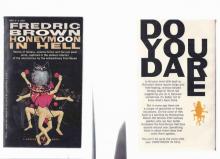 Hall of Mirrors
Hall of Mirrors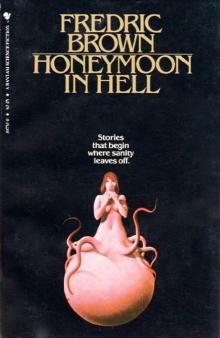 Honeymoon in Hell
Honeymoon in Hell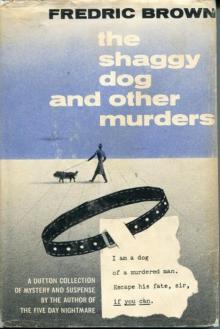 The Shaggy Dog and Other Murders
The Shaggy Dog and Other Murders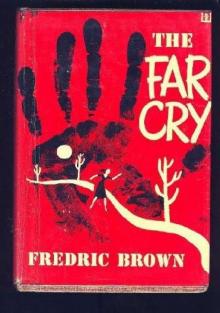 The Far Cry
The Far Cry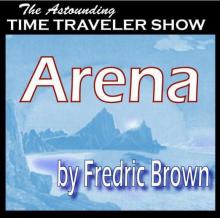 Arena
Arena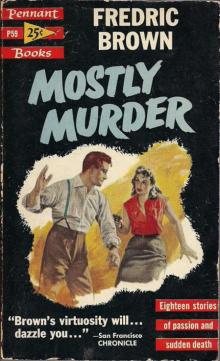 Mostly Murder
Mostly Murder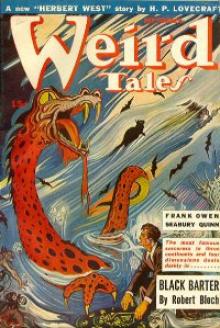 The Geezenstacks
The Geezenstacks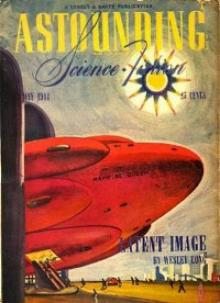 The Yehudi Principle
The Yehudi Principle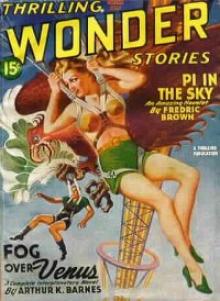 Pi in the Sky
Pi in the Sky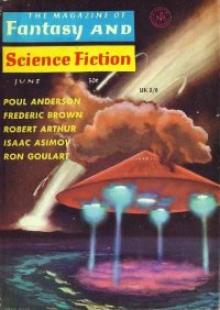 Eine Kleine Nachtmusik
Eine Kleine Nachtmusik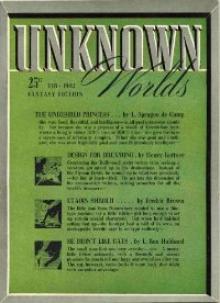 Etaoin Shrdlu
Etaoin Shrdlu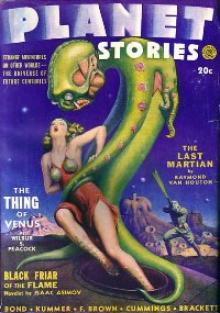 The Star Mouse
The Star Mouse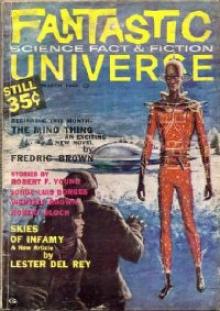 The Mind Thing
The Mind Thing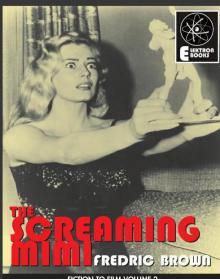 The Screaming Mimi
The Screaming Mimi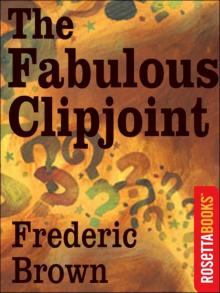 The Fabulous Clipjoint
The Fabulous Clipjoint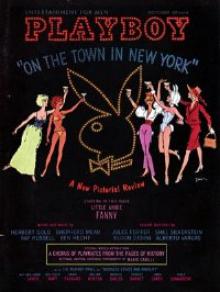 Puppet Show
Puppet Show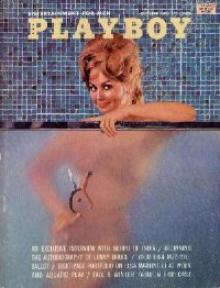 It Didn't Happen
It Didn't Happen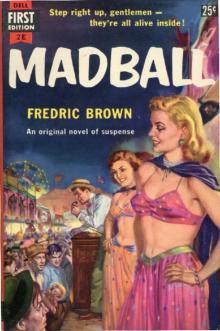 Madball
Madball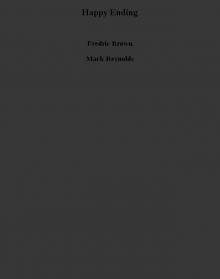 Happy Ending
Happy Ending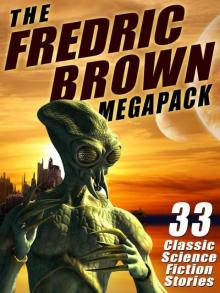 The Fredric Brown Megapack: 33 Classic Science Fiction Stories
The Fredric Brown Megapack: 33 Classic Science Fiction Stories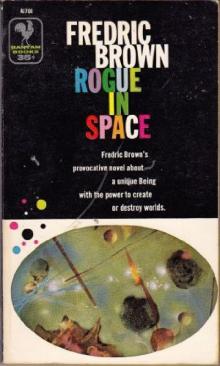 Rogue in Space
Rogue in Space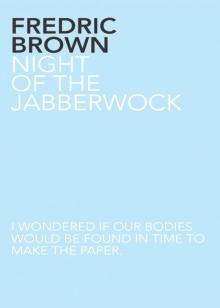 Night of the Jabberwock
Night of the Jabberwock The Dead Ringer
The Dead Ringer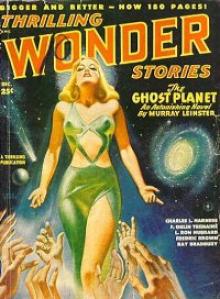 Knock
Knock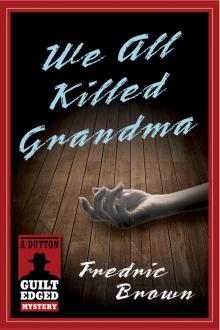 We All Killed Grandma
We All Killed Grandma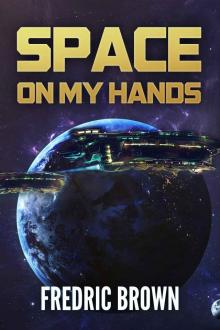 Space On My Hands
Space On My Hands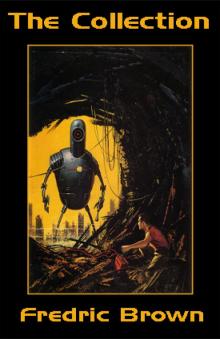 The Collection
The Collection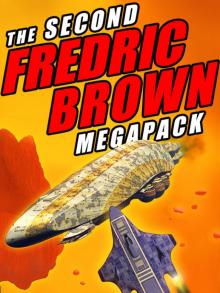 The Second Fredric Brown Megapack: 27 Classic Science Fiction Stories
The Second Fredric Brown Megapack: 27 Classic Science Fiction Stories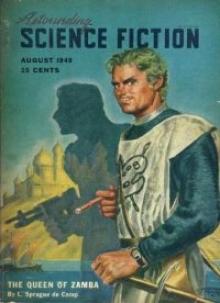 Letter to a Phoenix
Letter to a Phoenix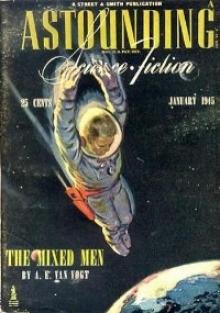 The Waveries
The Waveries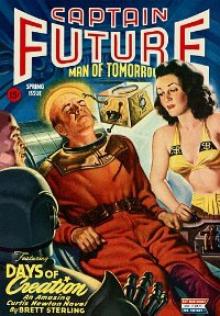 Nothing Sirius
Nothing Sirius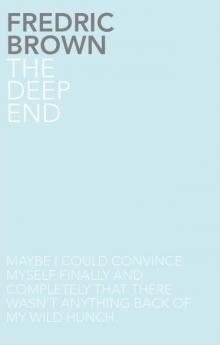 The Deep End
The Deep End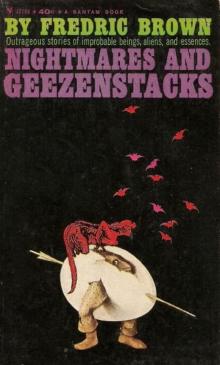 Nightmares & Geezenstacks
Nightmares & Geezenstacks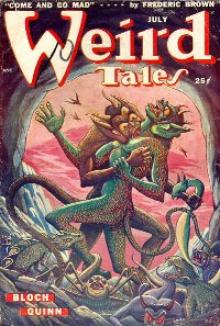 Come and Go Mad
Come and Go Mad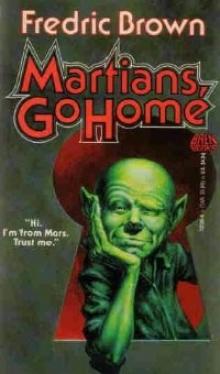 Martians, Go Home
Martians, Go Home